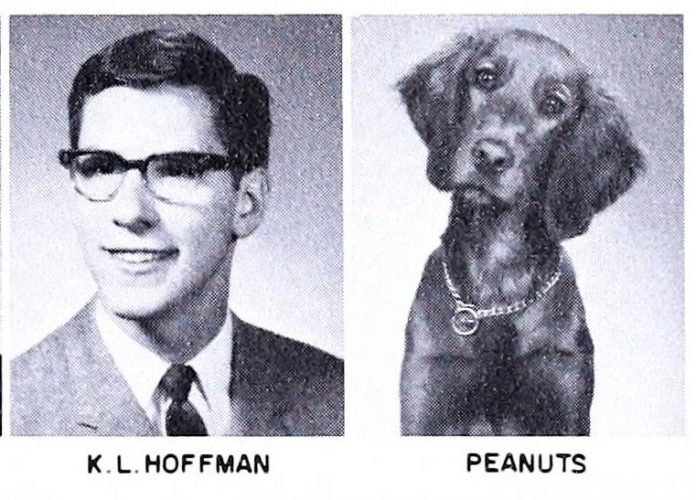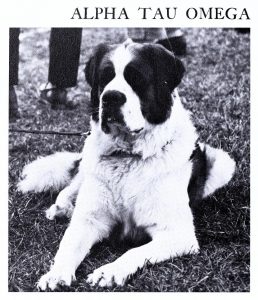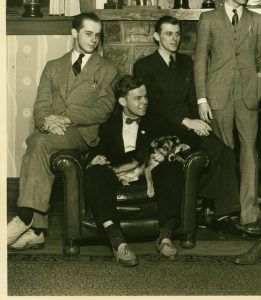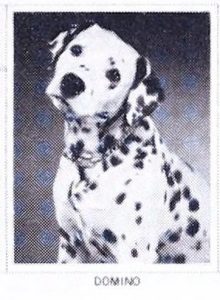
Whether you participate in it or not, Greek life has been a large part of Muhlenberg history since its opening. This history of Greek pride is especially true within the fraternity community, with Muhlenberg not becoming coed until the 1950s. Some early aspects of Greek life include Muhlenberg’s first ever fraternity – Phi Gamma Delta – which only lasted for 37 years, Muhlenberg’s oldest current fraternity – Alpha Tau Omega (ATO) – and the longest continuously running fraternity on Muhlenberg’s campus – Sigma Phi Epsilon – which has been on campus for nearly 80 straight years. All of these, even including Muhlenberg’s first sorority Delta Phi Nu in 1958, have a wealth of history with countless interesting facts and anecdotes. As valuable information as that may be, I decided to look at Muhlenberg’s Greek life in a different way; through its dogs.

With a long standing history in any fraternity, the “frat hound” or “house dog” has held its place as unofficial mascot of college fraternities for centuries. After browsing Total Frat Move’s website, an act I do not suggest, I found articles ranging from “Ranking the 15 Best Frat Hound Breeds,” featuring the poetic phrase “Bassett Hounds are chill as f**k” to the more nuanced “House dogs are the best dogs,” which is actually not an article at all but instead a picture of a dog with no text added. What I learned from this valuable resource is that the house dog is not only a lovable pet, but also a cherished brother.
The Muhlenberg men shared in this sentiment, with an adorable history of house dogs old and young. The first appearance of a house dog I could find was a blurry photograph of ATO in the 1933 yearbook. It wasn’t until two years later that he was clearly visible; even wearing an ATO vest.

Almost 10 years later in 1942, Phi Kappa Tau (PKT) was first pictured with their house dog, Butch, and it seemed like the craze was catching on. It wasn’t until the 1950’s that the house dogs were not only pictured regularly, but also named. This gave insight into the interesting dog names chosen.
Throughout the 1950s, the two fraternities with the biggest love for their four legged friends were Sig Ep and ATO. Sig Ep naturally named one of their dogs “Sig,” but also had the likes of “Pierre,” “Barfa,” and a dalmatian named “Domino” whereas ATO named one of their early dogs the surprisingly mundane “Chris,” while “Cerberus” was their house dog throughout the 50s and into the 60s.

Slowly but surely other fraternities joined in, and by the early 60s, the fraternities without dogs were in the minority. In 1962 alone, ATO had their trusty Cerberus, Phi Epsilon Pi had Jabez, Sig Ep had Domino, and TKE had Baron. This pattern continued, and as the population grew in size, so did the dogs. Nothing topped ATO’s adorably large St. Bernard named Gulliver. By the late 60s, fraternities such as Lambda Chi Alpha and Phi Kappa Tau had not only joined the Muhlenberg family, but also brought with them furry friends like Cindy and Mr. Bacchus. Muhlenberg house dog culture seemingly peaked in 1968 when Sig Ep had two house dogs: trusty companion Domino as well as newcomer Sham.
Though I feared the trend was ending due to a sudden lack of house pets in the first few years of the 1970s, I was pleasantly surprised that not only did the house dog survive the hippie era, but came back seemingly stronger than ever. Even sororities were showing their love with Phi Beta Kappa’s pet Barney in 1974.

Unfortunately, the early 1980s saw little mention of house pets, but another late decade resurgence showed one last hope before house dogs went the way of the dodo in 1993. The last evidence of a house dog at Muhlenberg comes in the form of Apollo, PKT’s dog pictured in the 1993 issue of the Ciarla.
Though a thing of the past at Muhlenberg and seemingly dwindling elsewhere, the frat hound has a long and proud history of bringing joy wherever it called home.
Karl Schultz is a Senior with a History major, German minor, and a certification in secondary education. He began writing for the Weekly his freshman year after his roommate, now Editor-in-Chief, forced him to. He mainly writes about Muhlenberg College's forgotten past through his "This Week in Muhlenberg History" segment.





















